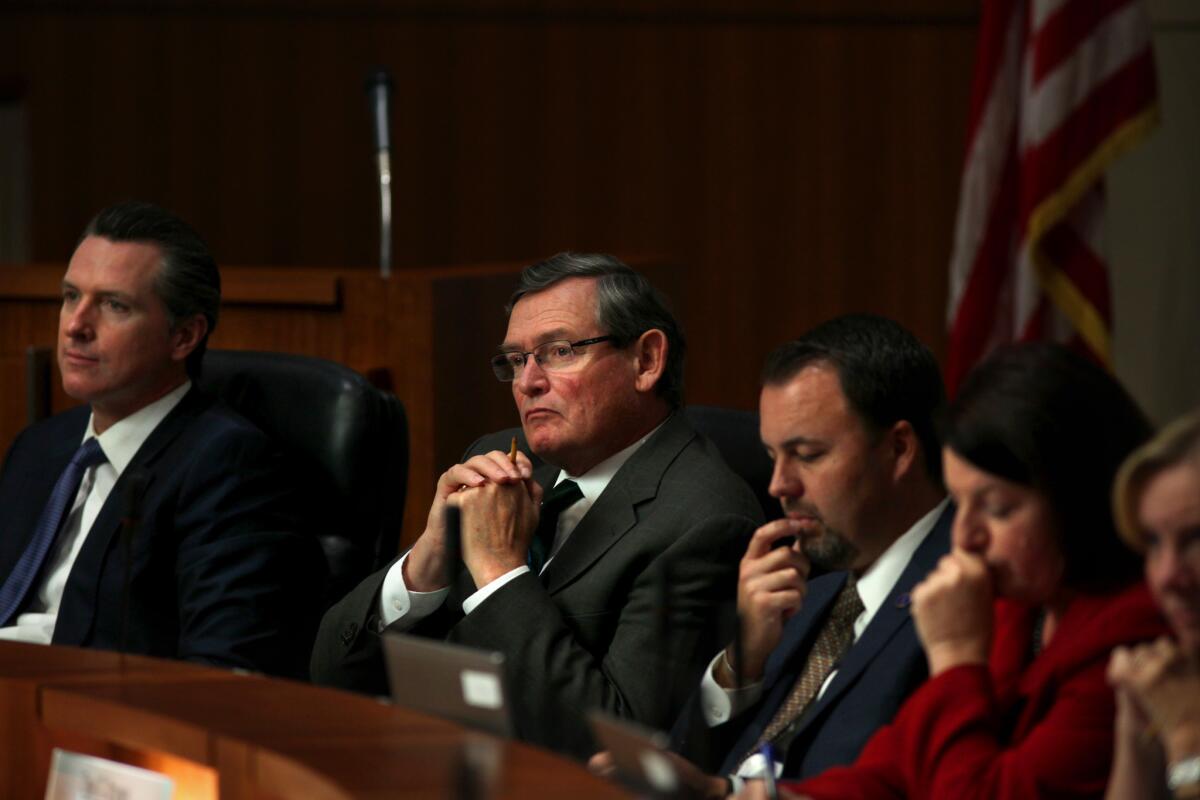Amid faculty protests, Cal State trustees set to talk money

Left to right, Lt. Gov. Gavin Newsom; CSU Chancellor Timothy P. White; Chair Lou Monville; and Speaker of Assembly Toni G. Atkins listen to public speakers Tuesday morning at the California State University Board of Trustees Meeting held at Dumke Auditorium in Long Beach.
- Share via
Hundreds of California State University faculty members seeking pay raises plan to rally Tuesday at a meeting of the Board of Trustees, who are scheduled to consider a request for additional state funding, lifting a cap on presidential pay and other hot-button issues.
The first agenda item will be a moment of silence for victims of Friday’s deadly Paris attacks, including Nohemi Gonzalez, a Cal State Long Beach design student. Gonzalez, 23, was with other Long Beach classmates on a study abroad trip and was killed when terrorists unleashed gunfire at a sidewalk café.
The rally comes nearly two weeks after the California Faculty Assn. announced that its members voted overwhelming to authorize a strike in a pay dispute that has roiled the 23-campus university system, the nation’s largest.
Faculty members representing campuses from Chico to San Diego are expected to descend on the Cal State chancellor’s Long Beach headquarters, with students and elected officials also set to speak.
The faculty union and Chancellor Timothy P. White are deadlocked over salary increases for 2015-16. White is offering a 2% across-the-board pay hike and the faculty group is demanding a 5% increase, with an additional 2.65% boost for faculty at the lower end of the pay scale.
“Their 2% pittance is insulting,” said Kevin Wehr, a Sacramento State sociology professor who is chairman of the bargaining team. “Chancellor White can end this with the stroke of a pen. Pay us.”
Cal State officials said their offer is part of a long-range plan to increase pay for all employees after years of stagnation during the recession.
The 2% increase for faculty is valued at about $32.8 million, officials said, and the faculty group’s proposal is valued at nearly $102 million, which they argue would prevent efforts to increase enrollment.
In 2011, faculty at the East Bay and Dominguez Hills campuses conducted one day strikes.
Among board actions, trustees will vote on the 2016-17 support budget, which proposes an additional $297.6 million in funding. Cal State is seeking an additional $241.7 million from the state and expects nearly $56 million more from tuition revenue.
The tuition revenue is predicated on a 3% increase in enrollment growth -- or about 12,000 students.
About $50 million of the total would be used for programs to help students stay in school and graduate more quickly; $25 million would go toward urgent maintenance and upgrades; nearly $70 million would be used to increase employee compensation; and $43 million would go toward mandatory costs such as health and pensions.
The budget request far outstrips the $139.4 million proposed under Gov. Jerry Brown’s multi-year funding plan, which would accommodate about 4,300 new students.
In recent years, from 22,000 to 32,000 qualified students have been denied admission because of insufficient state funding, according to Cal State officials.
Trustees are also scheduled to take action on a proposal to lift restrictions on pay raises for campus presidents, imposed after a series of controversial salary hikes drew complaints from students and lawmakers.
The current compensation policy was drafted in 2012 and freezes compensation paid with state funds while allowing a 10% increase paid from private donations.
The new plan would set compensation based on the median of salaries at comparable institutions, with a cap of 10% above the median. The board would be able to exceed that cap under extraordinary circumstances.
Meanwhile, a recent task force report that recommended incremental tuition increases for California residents and out-of-state students, year-round academic schedules and performance–based funding among other controversial changes, was not on the agenda and may be discussed in January, officials said.
The board is scheduled to meet Tuesday and Wednesday.
Twitter:@carlariveralat
More to Read
Sign up for Essential California
The most important California stories and recommendations in your inbox every morning.
You may occasionally receive promotional content from the Los Angeles Times.














